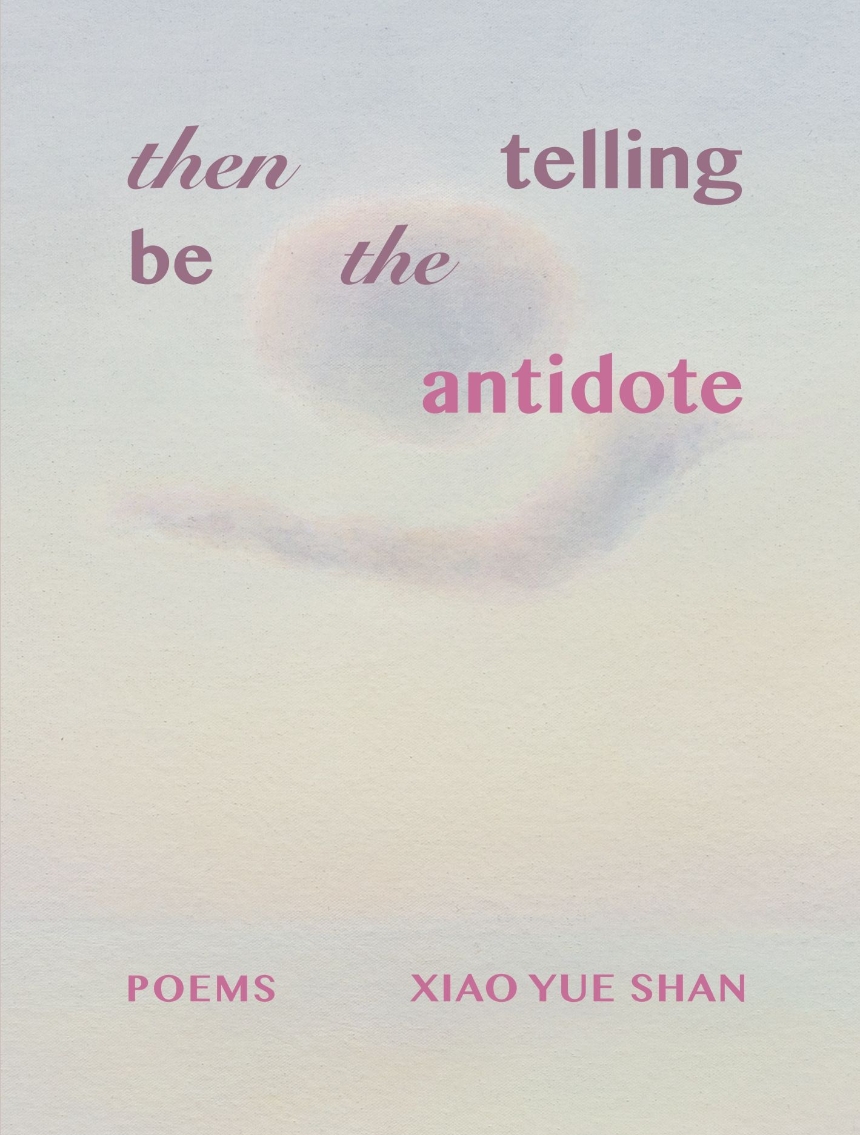Distributed for Tupelo Press
then telling be the antidote
In poems of memory, psychogeography, desire, and self-mythologization, then telling be the antidote is Xiao Yue Shan’s assertion against the malignancy of forceful silences.
By illuminating what has been left untold, these writings present the vivid landscape of a mind layering itself over the world, thinking and speaking its way through a myriad of places, objects, and visions. From rooms overlooking Tokyo rivers to Shanghai streets in the thrall of nighttime, Shan throws light on a nation’s quieted crevices, on the distances between the carnal and the eternal, and most pivotally, on the ability of language to elucidate fact with imagination.
By illuminating what has been left untold, these writings present the vivid landscape of a mind layering itself over the world, thinking and speaking its way through a myriad of places, objects, and visions. From rooms overlooking Tokyo rivers to Shanghai streets in the thrall of nighttime, Shan throws light on a nation’s quieted crevices, on the distances between the carnal and the eternal, and most pivotally, on the ability of language to elucidate fact with imagination.
Reviews
Table of Contents
acknowledgments viii
a photograph of tomorrow 1
striations 2
maps 7
rises in the urban population determining that each resident be
allotted 1.6 square metres of personal space 8
wealth distribution will not be considered
in the economic reform 9
the coming of spring in the time of martial law 10
witness 11
mong kok, october 2019 12
exile hong kong 13
exodus hong kong 14
the swift light against your face beautiful 17
on the last day of the heisei era 20
modals of lost opportunity 21
ideogram of morning 23
conjuring 25
the nation of aphasia 26
and hong kong in 2001 was always this shade of light blue 28
the right to work 30
inheritance 31
kitchen 33
she says to start with cold water 34
ornithomancy 35
taking note 37
some days come in like a bird through an open window 38
in love as in tourism 39
explain to me fate as if I were a child 40
decade 41
may 35th 43
only in silent shadows and in dreams 44
speak 45
speak again 47
in beijing the young writers ask me why people
always want to talk about censorship 48
the emperor and I dream of immortality 49
looking twice 53
search by no light 54
the dictionary of desire 55
the man I love ran off with everything except my poems 57
eve on a one night stand 58
a photograph of tomorrow 1
striations 2
maps 7
rises in the urban population determining that each resident be
allotted 1.6 square metres of personal space 8
wealth distribution will not be considered
in the economic reform 9
the coming of spring in the time of martial law 10
witness 11
mong kok, october 2019 12
exile hong kong 13
exodus hong kong 14
the swift light against your face beautiful 17
on the last day of the heisei era 20
modals of lost opportunity 21
ideogram of morning 23
conjuring 25
the nation of aphasia 26
and hong kong in 2001 was always this shade of light blue 28
the right to work 30
inheritance 31
kitchen 33
she says to start with cold water 34
ornithomancy 35
taking note 37
some days come in like a bird through an open window 38
in love as in tourism 39
explain to me fate as if I were a child 40
decade 41
may 35th 43
only in silent shadows and in dreams 44
speak 45
speak again 47
in beijing the young writers ask me why people
always want to talk about censorship 48
the emperor and I dream of immortality 49
looking twice 53
search by no light 54
the dictionary of desire 55
the man I love ran off with everything except my poems 57
eve on a one night stand 58

